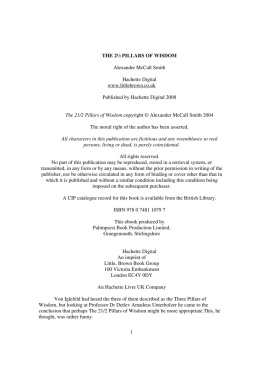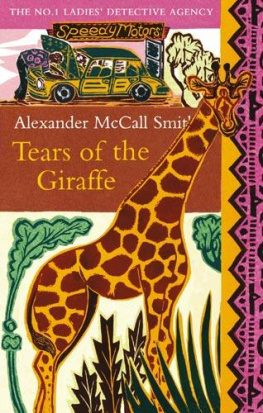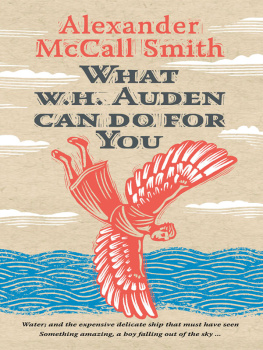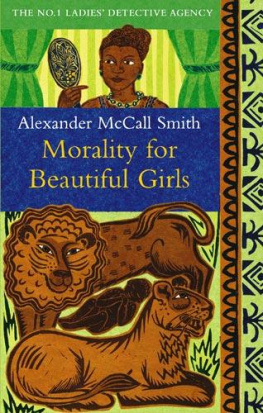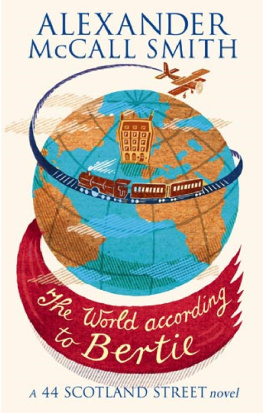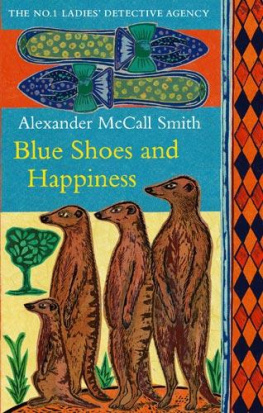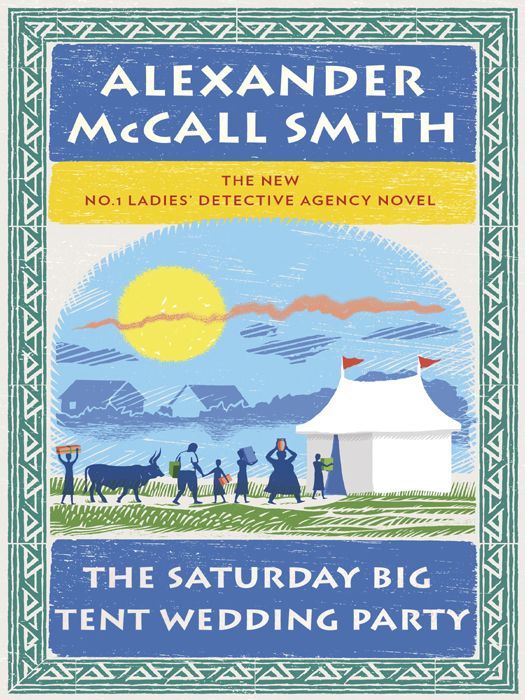This is a work of fiction. Names, characters, places, and incidents either are the product of the authors imagination or are used fictitiously. Any resemblance to actual persons, living or dead, events, or locales is entirely coincidental.
Copyright 2011 by Alexander McCall Smith
All rights reserved. Published in the United States by Pantheon Books, a division of Random House, Inc., New York. Originally published in Great Britain by Little, Brown, an imprint of Little, Brown Book Group, a Hachette U.K. Company, London.
Pantheon Books and colophon are registered trademarks of Random House, Inc.
Jacket illustration by Iain McIntosh
Library of Congress Cataloging-in-Publication Data
McCall Smith, Alexander, [date]
The Saturday big tent wedding party / Alexander McCall Smith.
p. cm.
eISBN: 978-0-307-37963-4
1. Ramotswe, Precious (Fictitious character)Fiction. 2. Women private investigatorsBotswanaFiction. 3. BotswanaSocial life and customsFiction. 4. WeddingsBotswanaFiction. 5. No. 1 Ladies Detective Agency (Imaginary organization)Fiction. I. Title.
PR 6063. C 326 S 37 2011 823.914dc22 2010054099
www.pantheonbooks.com
v3.1
This book is for Professor Max Essex
of the Harvard AIDS Initiative,
in admiration of the work that he has done.
Contents
CHAPTER ONE

THE MEMORY OF LOST THINGS
M MA RAMOTSWE had by no means forgotten her late white van. It was true that she did not brood upon it, as some people dwell on things of the past, but it still came to mind from time to time, often at unexpected moments. Memories of that which we have lost are curious thingsweeks, months, even years may pass without any recollection of them and then, quite suddenly, something will remind us of a lost friend, or of a favourite possession that has been mislaid or destroyed, and then we will think: Yes, that is what I had and I have no longer.
Her van had been her companion and friend for many years. Can a vehiclea collection of mechanical bits and pieces, nuts and bolts and parts the names of which one has not the faintest idea ofcan such a thing be a friend? Of course it can: physical objects can have personalities, at least in the eyes of their owners. To others, it may only be a van, but to the owner it may be the friend that has started loyally each morningexcept sometimes; that has sat patiently during long hours of waiting outside the houses of suspected adulterers; that has carried one home in the late afternoon, tired after a days work at the No. 1 Ladies Detective Agency. And just like a person, a car or a van may have likes and dislikes. A good tar road is balm to man and machine and may produce a humming sound of satisfaction in both car and driver; an unpaved road, concealing behind each bend a deep pothole or tiny mountain range of corrugations, may provoke rattles and groans of protest from even the most tolerant of vehicles. For this reason, the owners of cars may be forgiven for thinking that under the metal there lurks something not all that different from a human soul.
Mma Ramotswes van had served her well, and she loved it. Its life, though, had been a hard one. Not only had it been obliged to cope with dust, which, as anybody who lives in a dry country will know, can choke a vehicle to death, but its long-suffering suspension had been required to deal with persistent overloading, at least on the drivers side. That, of course, was the side on which Mma Ramotswe sat, and she was, by her own admission and description, a traditionally built person. Such a person can wear down even the toughest suspension, and this is exactly what happened in the case of the tiny white van, which permanently listed to starboard as a result.
Mma Ramotswes husband, Mr. J.L.B. Matekoni, that excellent man, proprietor of Tlokweng Road Speedy Motors and widely regarded as the best mechanic in all Botswana, had done his best to address the problem, but had tired of having to change the vans shock absorbers from side to side so as to equalise the strain. Yet it went further than that. The engine itself had started to make a sinister sound, which grew in volume until eventually the big-end failed.
I am just a mechanic, Mma Ramotswe, he had said to his wife. A mechanic is a man who fixes cars and other vehicles. That is what a mechanic does.
Mma Ramotswe had listened politely, but her heart within her was a stone of fear. She knew that the fate of her van was at stake, and she would prefer not to know that. I think I understand what a mechanic does, Rra, she said. And you are a very good mechanic, quite capable of fixing a
She did not finish. The normally mild Mr. J.L.B. Matekoni had raised a finger. A mechanic, Mma, he pronounced, is different from a miracle-worker. A miracle-worker is a person who works miracles. A mechanic cannot do that. And so when the time comes for a vehicle to dieand they are mortal, Mma, I can assure youthen he cannot wave a wand and make the car new again. He paused, looking at her with the air of a doctor imparting bad news. And so
He had done his best for her, of course, and bought her a spanking new van, blue this time, with an array of buttons on the dashboard that she had not yet dared investigate, and with an engine so quiet and unobtrusive that it was sometimes possible to believe that it was not switched on at all and that it was gravity alone, or some other mysterious force, that was propelling the van down the road. She tried to appear grateful, but it was hard. It was true that the point of a vehicle was to get you from one place to another without incident, but that, she thought, was not the only consideration. If efficiency were the only value in this life, then we would be content to eat bland but nutritious food every dayand the same food at that. That would keep us alive, but it would make for very dull mealtimes. And the same was true of transport: there was all the world of difference between travelling along a highway in an air-conditioned bus, behind tinted glass, and making the same journey by a side-road, on a cart pulled by a team of mules, with the morning air fresh against your face and the branches of the acacia trees brushing past so close that you could reach out to touch the delicate green leaves. There was all that difference.
The tiny white van had gone to a scrap dealer, and that, she thought, was the end. But then she encountered a woman who told her that a nephew of hers had acquired the van, and towed it up to his place near the Tuli Block. He loved tinkering, she said, and he might be able to do something with the parts that he could strip from the body of the van. That was all Mma Ramotswe heard, and nothing more. It was a better fate, perhaps, than that of total destruction in the jaws of some metal-crushing predator, but still she hoped that the young man who had bought the van for scrap might exercise his mechanical skills and restore it. And that possibility she kept in her mind, tucked away among the other scraps of hope of the sort that we go through life with, not thinking about them very much but unwilling to let them fade away altogether.
Now, on this crisp Botswana day, at the tail end of a winter that, for all its cold mornings, was still drenched in clear and constant sun, Mma Ramotswe was reminded of her former van by something she saw on the road. She was driving past the Ministry of Water Affairs, her mind on a case that she had been working on for some time and was no nearer resolution than when she had started. She wondered whether she should not begin afresh, abandoning all the information she had obtained, and speaking to everybody again from scratch; possibly, she thought, it might be easier if And then, out of the corner of her eye, she saw what seemed to be her tiny white van. It was not just that she saw a white vanthey were common enough in a country where the most popular colour for a vehicle was whiteit was the fact that the white vehicle she saw had the



